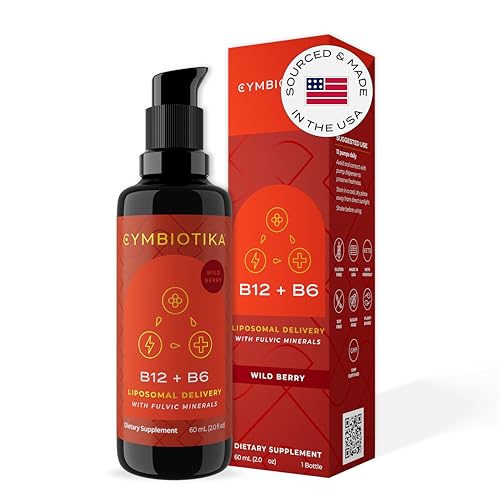
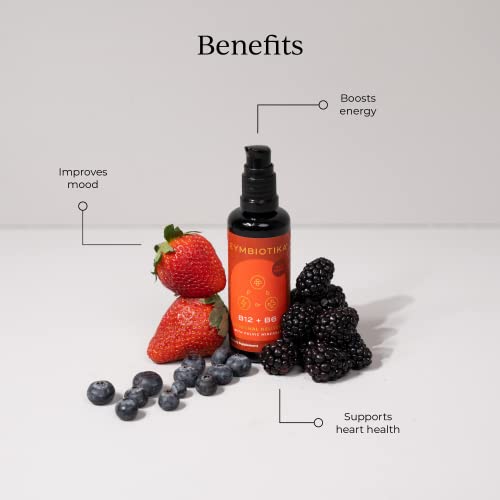
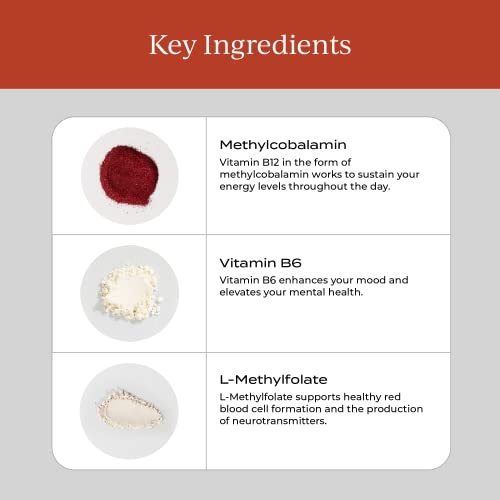
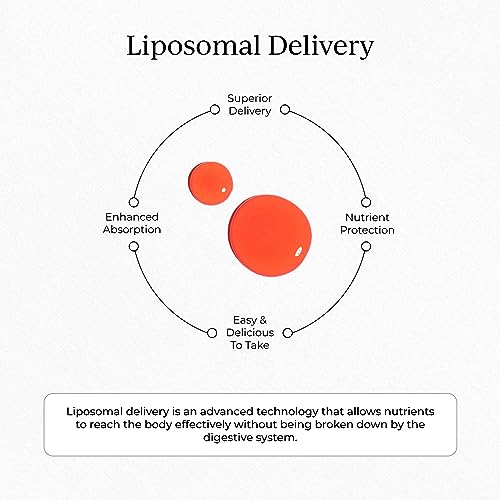
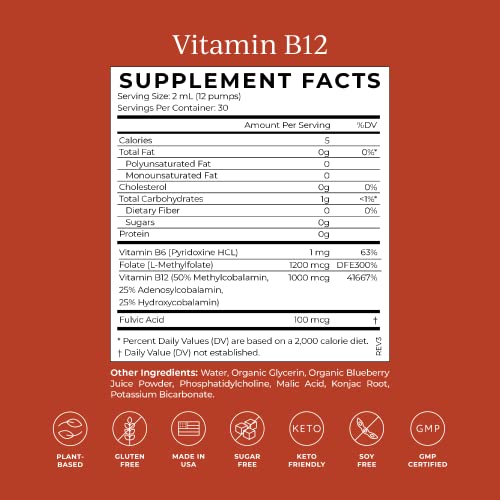
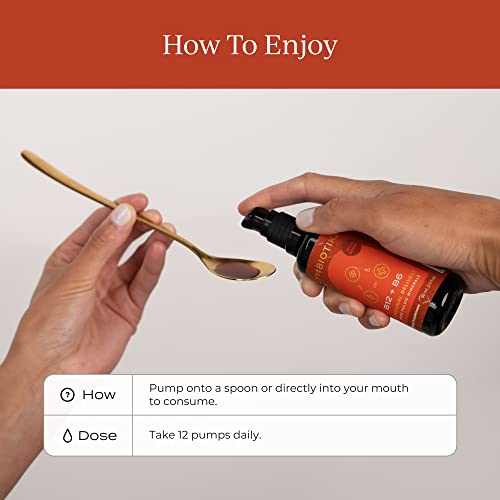
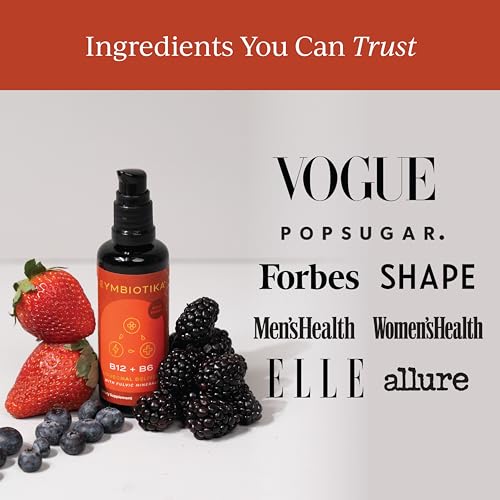
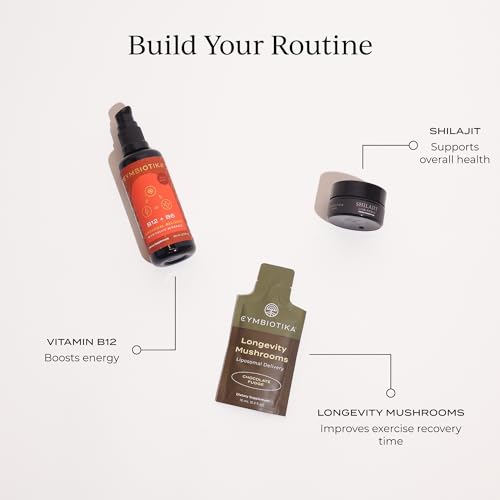
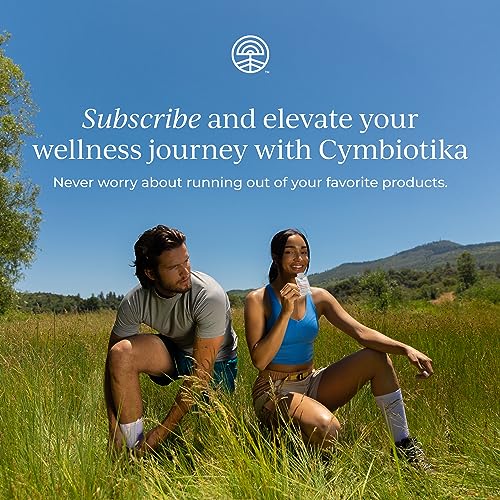
CYMBIOTIKA Liposomal Vitamin B12 - Boosts Energy & Supports Hair, Skin, Nails - 2 oz


Malic Acid
High RiskMalic acid is a naturally occurring organic acid found in various fruits, particularly apples. It plays a role in the metabolic processes of living organisms and is commonly used as a flavoring agent, pH regulator, and preservative in food and cosmetic products.
Sustai Insights
Malic acid serves as an effective pH adjuster and flavor enhancer, contributing to the sensory profile of products. However, it may cause skin and eye irritation and has high use restrictions, limiting its application. Regulatory bodies have noted these concerns, leading to restrictions on its use in certain products. Overall, the ingredient is considered high risk due to these factors, necessitating careful usage and consideration of safer alternatives.
Lecithin
Medium RiskLecithin is a naturally occurring lipid found in various plant and animal tissues, primarily composed of phospholipids. It serves as an emulsifier, stabilizing mixtures of oil and water, and is commonly used in food, cosmetics, and pharmaceuticals to improve texture and extend shelf life.
Sustai Insights
Lecithin provides functional benefits as an effective emulsifier and stabilizer, enhancing product texture while being sustainably sourced from natural origins. Health risks are generally low, with moderate concerns regarding allergies and immunotoxicity but minimal cancer or reproductive toxicity risks. Environmental hazards are limited, and it is not classified as a pollutant. Regulatory bodies impose few restrictions. Overall, lecithin presents a medium risk, suggesting caution in usage, especially for sensitive individuals. Alternatives include sunflower lecithin or other plant-based emulsifiers that may offer similar benefits with reduced allergenic potential.
Apple Pectin
Low RiskApple pectin is a natural polysaccharide found in the cell walls of apples. It is commonly used as a gelling agent, thickener, and stabilizer in food products, as well as in cosmetics and pharmaceuticals. Its gelling properties are utilized to improve texture and consistency.
Sustai Insights
Apple pectin serves as an effective thickener and stabilizer, contributing to the texture of various products. It is biodegradable and derived from renewable sources, enhancing its sustainability profile. Health risks are minimal, with low concerns for carcinogenicity, allergies, or reproductive toxicity. Environmental impact is also low, with no known pollutants or bioaccumulation issues. Regulatory status is clear, with no current restrictions. Overall, the risk level associated with apple pectin is low, making it a safe ingredient for use in formulations.
Pyridoxine
Low RiskPyridoxine is a substituted aromatic compound, primarily known as vitamin B6. It plays a crucial role in various metabolic processes, including amino acid metabolism, neurotransmitter synthesis, and the production of hemoglobin.
Sustai Insights
Pyridoxine serves essential functions in metabolic processes and is vital for overall health. It poses low health risks, with minimal concerns related to carcinogenicity, allergies, or reproductive toxicity. Environmentally, it is not considered a pollutant or bioaccumulative. Regulatory bodies have not imposed significant restrictions, indicating a low risk overall. Safe usage practices are encouraged, and alternatives like other B vitamins can be considered.
Cyanocobalamin (Vitamin B12)
Low RiskCyanocobalamin, commonly known as vitamin B12, is a water-soluble vitamin essential for red blood cell formation, neurological function, and DNA synthesis. It is utilized in dietary supplements and fortified foods to prevent or treat B12 deficiency, particularly in individuals with limited dietary intake or absorption issues.
Sustai Insights
Cyanocobalamin serves critical physiological functions including energy metabolism and red blood cell production. It is deemed safe with low health risk concerns across various categories such as cancer, allergies, and reproductive toxicity. Environmental impact is minimal, lacking bioaccumulation or significant pollutants. Regulatory bodies, including the FDA, recognize its safety, affirming low risk overall. Recommended usage involves adherence to established dietary allowances, with few noted alternatives. Therefore, the overall assessment indicates low risk.
Cobinamide, Cobalt Methyl Derivative, Hydroxide, Dihydrogen Phosphate (Ester), Inner Salt,3'
Low RiskCobinamide, a cobalt methyl derivative, serves primarily as a cofactor in enzymatic processes and is involved in the metabolism of certain compounds in the body. It is not currently associated with skin sensitization or common use restrictions.
Sustai Insights
Cobinamide is recognized for its role in metabolic functions and has low associated health risks, including negligible concerns regarding carcinogenicity, allergies, or reproductive toxicity. Environmentally, it poses minimal risk, lacking bioaccumulative properties or significant pollution potential. Regulatory bodies do not impose restrictions on its use, indicating a low-risk profile overall. Safe usage practices are advisable, and while alternatives are limited, seeking sustainable sourcing methods is encouraged.
Potassium Bicarbonate
Low RiskPotassium bicarbonate is an inorganic salt commonly used in various products for its buffering and leavening properties. It acts as an effective pH regulator and is often utilized in food processing, pharmaceuticals, and as a cleaning agent.
Sustai Insights
Potassium bicarbonate serves multiple functional benefits, including acting as a leavening agent in baking and a buffering agent in food and pharmaceuticals. It is considered to have low health risks, with minimal concerns regarding carcinogenicity, allergies, and reproductive toxicity. Environmental risks are also low, as it does not significantly contribute to pollution or bioaccumulation. Regulatory assessments indicate no current restrictions. Safe usage practices should be followed to avoid irritation, and alternatives include sodium bicarbonate for similar functions. Overall, the risk level associated with potassium bicarbonate is low.
Tocopherol, D Alpha
Low RiskTocopherol, specifically d-alpha tocopherol, is a naturally occurring form of Vitamin E. It is commonly used in cosmetic and personal care products primarily for its antioxidant properties, helping to protect formulations from oxidation and extend shelf life.
Sustai Insights
D-alpha tocopherol provides effective antioxidant benefits, contributing to product stability. It is sustainably sourced and generally regarded as safe, with low concerns regarding carcinogenicity, allergies, and reproductive toxicity. However, there are minor concerns about endocrine disruption. Regulatory bodies have not imposed significant restrictions, indicating low overall risk. Recommended usage practices include adhering to established safe concentration thresholds. Alternatives, such as other forms of Vitamin E or plant-based antioxidants, may also be considered.
Apple Pectin
Low RiskApple pectin is a natural polysaccharide found in the cell walls of apples. It is commonly used as a gelling agent, thickener, and stabilizer in food products, as well as in cosmetics and pharmaceuticals. Its gelling properties are utilized to improve texture and consistency.
Sustai Insights
Apple pectin serves as an effective thickener and stabilizer, contributing to the texture of various products. It is biodegradable and derived from renewable sources, enhancing its sustainability profile. Health risks are minimal, with low concerns for carcinogenicity, allergies, or reproductive toxicity. Environmental impact is also low, with no known pollutants or bioaccumulation issues. Regulatory status is clear, with no current restrictions. Overall, the risk level associated with apple pectin is low, making it a safe ingredient for use in formulations.
Pyridoxine
Low RiskPyridoxine is a substituted aromatic compound, primarily known as vitamin B6. It plays a crucial role in various metabolic processes, including amino acid metabolism, neurotransmitter synthesis, and the production of hemoglobin.
Sustai Insights
Pyridoxine serves essential functions in metabolic processes and is vital for overall health. It poses low health risks, with minimal concerns related to carcinogenicity, allergies, or reproductive toxicity. Environmentally, it is not considered a pollutant or bioaccumulative. Regulatory bodies have not imposed significant restrictions, indicating a low risk overall. Safe usage practices are encouraged, and alternatives like other B vitamins can be considered.
Malic Acid
High RiskMalic acid is a naturally occurring organic acid found in various fruits, particularly apples. It plays a role in the metabolic processes of living organisms and is commonly used as a flavoring agent, pH regulator, and preservative in food and cosmetic products.
Sustai Insights
Malic acid serves as an effective pH adjuster and flavor enhancer, contributing to the sensory profile of products. However, it may cause skin and eye irritation and has high use restrictions, limiting its application. Regulatory bodies have noted these concerns, leading to restrictions on its use in certain products. Overall, the ingredient is considered high risk due to these factors, necessitating careful usage and consideration of safer alternatives.
Cyanocobalamin (Vitamin B12)
Low RiskCyanocobalamin, commonly known as vitamin B12, is a water-soluble vitamin essential for red blood cell formation, neurological function, and DNA synthesis. It is utilized in dietary supplements and fortified foods to prevent or treat B12 deficiency, particularly in individuals with limited dietary intake or absorption issues.
Sustai Insights
Cyanocobalamin serves critical physiological functions including energy metabolism and red blood cell production. It is deemed safe with low health risk concerns across various categories such as cancer, allergies, and reproductive toxicity. Environmental impact is minimal, lacking bioaccumulation or significant pollutants. Regulatory bodies, including the FDA, recognize its safety, affirming low risk overall. Recommended usage involves adherence to established dietary allowances, with few noted alternatives. Therefore, the overall assessment indicates low risk.
Cobinamide, Cobalt Methyl Derivative, Hydroxide, Dihydrogen Phosphate (Ester), Inner Salt,3'
Low RiskCobinamide, a cobalt methyl derivative, serves primarily as a cofactor in enzymatic processes and is involved in the metabolism of certain compounds in the body. It is not currently associated with skin sensitization or common use restrictions.
Sustai Insights
Cobinamide is recognized for its role in metabolic functions and has low associated health risks, including negligible concerns regarding carcinogenicity, allergies, or reproductive toxicity. Environmentally, it poses minimal risk, lacking bioaccumulative properties or significant pollution potential. Regulatory bodies do not impose restrictions on its use, indicating a low-risk profile overall. Safe usage practices are advisable, and while alternatives are limited, seeking sustainable sourcing methods is encouraged.
Potassium Bicarbonate
Low RiskPotassium bicarbonate is an inorganic salt commonly used in various products for its buffering and leavening properties. It acts as an effective pH regulator and is often utilized in food processing, pharmaceuticals, and as a cleaning agent.
Sustai Insights
Potassium bicarbonate serves multiple functional benefits, including acting as a leavening agent in baking and a buffering agent in food and pharmaceuticals. It is considered to have low health risks, with minimal concerns regarding carcinogenicity, allergies, and reproductive toxicity. Environmental risks are also low, as it does not significantly contribute to pollution or bioaccumulation. Regulatory assessments indicate no current restrictions. Safe usage practices should be followed to avoid irritation, and alternatives include sodium bicarbonate for similar functions. Overall, the risk level associated with potassium bicarbonate is low.
Lecithin
Medium RiskLecithin is a naturally occurring lipid found in various plant and animal tissues, primarily composed of phospholipids. It serves as an emulsifier, stabilizing mixtures of oil and water, and is commonly used in food, cosmetics, and pharmaceuticals to improve texture and extend shelf life.
Sustai Insights
Lecithin provides functional benefits as an effective emulsifier and stabilizer, enhancing product texture while being sustainably sourced from natural origins. Health risks are generally low, with moderate concerns regarding allergies and immunotoxicity but minimal cancer or reproductive toxicity risks. Environmental hazards are limited, and it is not classified as a pollutant. Regulatory bodies impose few restrictions. Overall, lecithin presents a medium risk, suggesting caution in usage, especially for sensitive individuals. Alternatives include sunflower lecithin or other plant-based emulsifiers that may offer similar benefits with reduced allergenic potential.
Tocopherol, D Alpha
Low RiskTocopherol, specifically d-alpha tocopherol, is a naturally occurring form of Vitamin E. It is commonly used in cosmetic and personal care products primarily for its antioxidant properties, helping to protect formulations from oxidation and extend shelf life.
Sustai Insights
D-alpha tocopherol provides effective antioxidant benefits, contributing to product stability. It is sustainably sourced and generally regarded as safe, with low concerns regarding carcinogenicity, allergies, and reproductive toxicity. However, there are minor concerns about endocrine disruption. Regulatory bodies have not imposed significant restrictions, indicating low overall risk. Recommended usage practices include adhering to established safe concentration thresholds. Alternatives, such as other forms of Vitamin E or plant-based antioxidants, may also be considered.
Experience the vitality of CYMBIOTIKA Liposomal Vitamin B12 Liquid Supplement, designed for those prioritizing health and sustainability. This potent blend of B12 and B6 supports energy, cell production, and enhances hair, skin, and nails. With advanced liposomal technology, it ensures maximum absorption for optimal benefits.
- Supports Natural Energy: Provides cellular energy without the jitters of caffeine, promoting overall wellbeing and focus.
- Boosts Mood & Mental Health: Vitamin B6 aids in enhancing mood and supports healthy neurotransmitter production, contributing to a positive mental state.
- Nourishes Hair, Skin & Nails: The nutrient-rich formula plays a vital role in maintaining healthy hair, skin, and nails, making it a beauty essential.
- Easy Daily Use: Simply take 12 pumps daily; enjoy it alone or with meals for a convenient boost to your routine.
- Commitment to Purity: Non-GMO, gluten-free, vegan, and free from harmful additives, this supplement reflects a dedication to clean, sustainable health solutions.
Subscribe & Save with Sustai
- Best Price Guarantee: Always enjoy the lowest prices on sustainable home essentials.
- No Surprises: We’ll notify you before shipping. No hidden fees, ever.
- You’re in Charge: Change, pause, or cancel your subscription anytime with ease.
- Eco-Friendly Deliveries: Our grouped shipments mean less packaging and lower emissions.
Join us on a sustainable journey. Special offers for a limited time! Prices and promotions may change.
Recommended Products
Experience the vitality of CYMBIOTIKA Liposomal Vitamin B12 Liquid Supplement, designed for those prioritizing health and sustainability. This potent blend of B12 and B6 supports energy, cell production, and enhances hair, skin, and nails. With advanced liposomal technology, it ensures maximum absorption for optimal benefits.
- Supports Natural Energy: Provides cellular energy without the jitters of caffeine, promoting overall wellbeing and focus.
- Boosts Mood & Mental Health: Vitamin B6 aids in enhancing mood and supports healthy neurotransmitter production, contributing to a positive mental state.
- Nourishes Hair, Skin & Nails: The nutrient-rich formula plays a vital role in maintaining healthy hair, skin, and nails, making it a beauty essential.
- Easy Daily Use: Simply take 12 pumps daily; enjoy it alone or with meals for a convenient boost to your routine.
- Commitment to Purity: Non-GMO, gluten-free, vegan, and free from harmful additives, this supplement reflects a dedication to clean, sustainable health solutions.

You can have at most 2 Sustainable Steals products in your cart
Customer Reviews
This product has no reviews yet.




